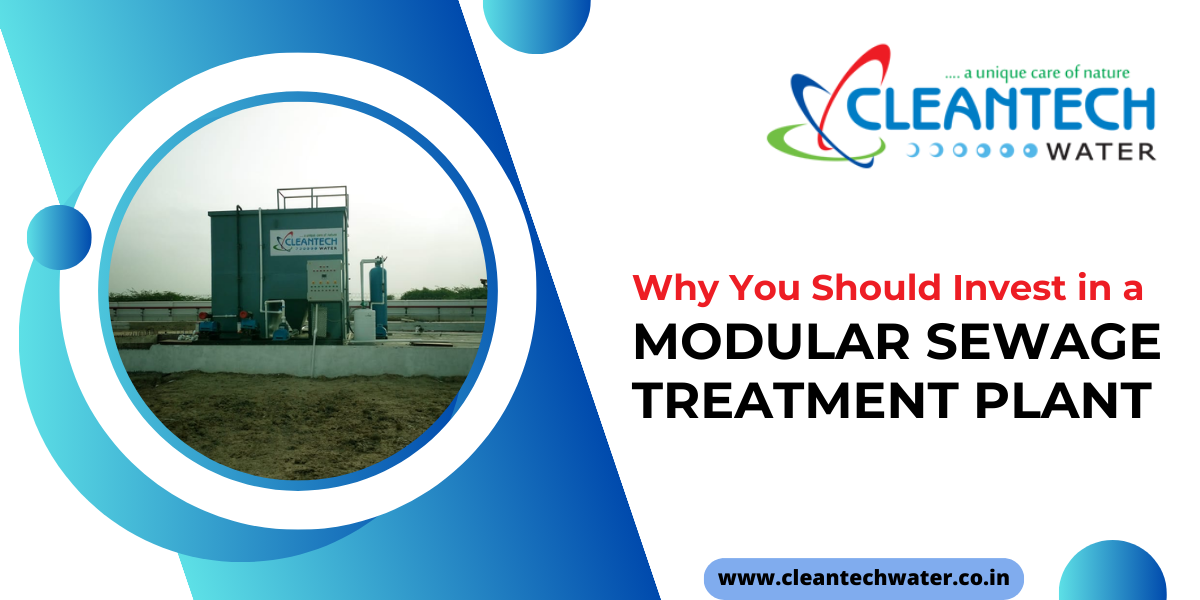In today’s era of environmental consciousness and regulatory requirements, the demand for effective wastewater management solutions continues to grow. Among the innovative approaches gaining popularity is the Modular Sewage Treatment Plant (MSTP). Offering flexibility, efficiency, and scalability, MSTPs are becoming the go-to choice for businesses aiming to manage sewage effectively while minimising environmental impact.
This article discusses the basics of MSTPs to make an informed decision for your business and the environment.

How Modular Sewage Treatment Plants Work
Modular sewage treatment plants function on the same fundamental principles as traditional systems but with the added advantages of modularity and compactness. The process begins with the intake of sewage water from residential, commercial, or industrial sources. This wastewater undergoes a series of treatment stages within the MSTP to ensure it meets regulatory standards before discharge.
Key components of an MSTP typically include preliminary treatment units like screens and grit chambers to remove large solids and debris. Following this, the sewage undergoes biological treatment where aerobic or anaerobic processes break down organic matter. Advanced treatment technologies such as membrane filtration or UV disinfection may also be integrated to achieve higher purification levels.
The step-by-step process within an MSTP involves:
- Screening and Grit Removal: Initial screening removes large objects and grit that could damage downstream equipment.
- Primary Treatment: Sedimentation or flotation processes separate suspended solids and settleable organic matter from the wastewater.
- Biological Treatment: In this phase, microorganisms degrade organic pollutants into simpler substances. Aerobic treatment uses oxygen, while anaerobic treatment operates in an oxygen-free environment.
- Secondary Treatment: Further biological processes or chemical treatments reduce the concentration of contaminants, ensuring water quality compliance.
- Tertiary Treatment: Optional processes such as filtration, disinfection, or nutrient removal polish the treated water to meet specific discharge or reuse standards.
Types of Modular Sewage Treatment Plants
Modular sewage treatment plants come in various designs tailored to different applications and capacities. Two common types include:
- Containerised MSTPs: These units are housed within standard shipping containers, offering mobility and ease of deployment. Containerised MSTPs are ideal for temporary installations or sites with limited space, such as construction camps or remote communities.
- Skid-mounted MSTPs: Built on a skid frame for easy transportation and installation, these units are versatile and can be customised based on specific site requirements. They are commonly used in commercial and industrial settings where scalability and operational flexibility are crucial.
Comparing these types based on usage and capacity:
- Containerised MSTPs are suitable for smaller capacities and temporary projects due to their compact size and mobility.
- Skid-mounted MSTPs are scalable and adaptable, making them ideal for larger installations that require flexibility in treatment capacity and operational efficiency.
Examples of modular sewage treatment plants in different settings highlight their versatility:
- Residential Applications: Compact containerised MSTPs can efficiently treat sewage from housing complexes or gated communities, ensuring residents have access to clean water without burdening municipal systems.
- Industrial Applications: Skid-mounted MSTPs are employed by industries like manufacturing and food processing to treat wastewater generated from production processes. These units can handle varying loads and contaminants typical of industrial effluents.
Advantages of Modular Sewage Treatment Plants
Modular sewage treatment plants offer a range of compelling advantages that make them a preferred choice for businesses seeking efficient sewage management solutions. Whether for industrial, commercial, or residential applications, MSTPs excel in providing flexibility, sustainability, and cost-effectiveness.
Flexibility and Scalability:
One of the standout features of MSTPs is their modular design, which allows for easy scalability. Businesses can expand or reduce treatment capacity by adding or removing modules as needed. This flexibility makes MSTPs suitable for small-scale applications, such as rural communities or construction sites, and large-scale projects such as industrial complexes or urban developments. The ability to scale ensures businesses can adapt their wastewater treatment infrastructure to meet changing demands without significant downtime or disruption.
Cost-effectiveness and Efficiency:
Compared to traditional centralised plants, modular sewage treatment plants offer notable cost savings. Their modular construction reduces initial capital expenditures by eliminating the need for extensive on-site construction and infrastructure. Additionally, operational costs are minimised due to efficient energy consumption and optimised treatment processes. MSTPs are designed to achieve high treatment efficiencies while minimising chemical usage and operational complexities, resulting in long-term cost savings for businesses.
Speed of Installation and Deployment:
MSTPs are pre-engineered and factory-assembled, significantly reducing installation time compared to conventional treatment systems. This rapid deployment is critical for businesses requiring quick solutions to wastewater management challenges. For instance, modular units can be operational within weeks after delivery, making them ideal for emergency situations or temporary wastewater treatment needs.
Environmental Benefits and Sustainability:
Environmental stewardship is a primary driver behind the adoption of modular sewage treatment plants. These plants employ advanced treatment technologies that enhance water quality and reduce environmental impact. By treating wastewater close to the source, MSTPs minimise the need for long-distance transportation of sewage and lower associated carbon emissions. Additionally, treated effluent from MSTPs can often be reused for irrigation, industrial processes, or groundwater recharge, promoting water conservation and sustainability.
Low Maintenance Requirements:
MSTPs are designed for ease of maintenance and operation. Their modular components are typically housed in durable, corrosion-resistant materials that require minimal upkeep. Routine maintenance tasks, such as inspection and cleaning of filters or membranes, are straightforward and can be performed without specialised equipment or extensive training. This simplicity in maintenance contributes to reduced downtime and operational continuity for businesses relying on continuous wastewater treatment.
Compact Design and Space Efficiency:
The compact footprint of modular sewage treatment plants makes them suitable for installation in constrained or remote locations where space is limited. Containerised or skid-mounted units can be easily transported to the site and installed within existing infrastructure without significant land clearance or construction. This space efficiency is particularly advantageous for urban environments or industrial facilities where real estate is at a premium.
Low-Risk, Tried and Tested:
Modular Sewage Treatment Plants are built upon proven technologies and standardised processes that have been tested and refined over time. This reliability reduces project risks associated with new or unproven technologies, providing businesses with confidence in the performance and efficiency of their wastewater treatment systems. Manufacturers often offer performance guarantees and support services to ensure that MSTPs consistently meet regulatory standards and operational requirements.
Low Total Cost of Ownership:
In addition to low maintenance requirements, modular sewage treatment plants offer a low total cost of ownership over their lifecycle. Manufacturers and service providers offer comprehensive support packages that include regular servicing, spare parts availability, and technical assistance. This proactive approach to service and maintenance helps businesses optimise the performance and longevity of their wastewater treatment investments, ensuring long-term operational efficiency and compliance.
Applications of Modular Sewage Treatment Plants
MSTPs are versatile systems that find application across diverse sectors and environments, catering to specific needs ranging from urban infrastructure to disaster response and industrial requirements.
Urban vs. Rural Applications:
In urban settings, where centralised sewage systems may be overburdened or inadequate, MSTPs offer a decentralised solution. They can be installed in densely populated areas to treat wastewater locally, reducing strain on municipal infrastructure and improving water quality before discharge into water bodies or reuse. In contrast, rural areas with scattered populations or lack of centralised sewage systems benefit from MSTPs due to their scalability and ease of deployment. These systems provide reliable sanitation solutions, enhancing public health and environmental sustainability in remote communities.
Use in Disaster Relief and Emergencies:
During natural disasters or humanitarian crises, access to clean water and sanitation becomes critical. Modular sewage treatment plants play a critical role in providing rapid response solutions for temporary or makeshift settlements. Their modular design allows for quick installation and operation, ensuring immediate access to safe drinking water and proper sanitation facilities. Organisations involved in disaster relief operations often deploy MSTPs to mitigate health risks and maintain hygiene standards in affected areas until permanent infrastructure can be restored.
Implementation in Developing Countries:
Developing countries often face challenges in establishing robust sewage treatment infrastructure due to limited resources and rapid urbanisation. MSTPs offer a cost-effective and scalable solution tailored to local conditions. They can be deployed incrementally to meet growing demands, supporting sustainable development goals by improving water quality and sanitation services. By treating wastewater locally, MSTPs contribute to environmental protection and public health improvement, making them integral to infrastructure development in emerging economies.
Industrial and Commercial Applications:
Industries and commercial establishments generate significant volumes of wastewater containing complex contaminants that require specialised treatment. Modular sewage treatment plants are well-suited for such applications, offering customisable solutions tailored to specific effluent characteristics and regulatory requirements. They enable industries to achieve compliance with environmental regulations while minimising operational costs and resource consumption. From manufacturing facilities to hospitality sectors, MSTPs provide reliable wastewater treatment solutions that enhance operational efficiency and corporate sustainability.
Challenges and Considerations
While MSTPs offer numerous benefits, their implementation involves addressing several challenges and considerations to ensure optimal performance and regulatory compliance.
Potential Limitations of MSTPs:
Despite their versatility, MSTPs may have limitations in treating certain types of industrial effluents or handling fluctuating wastewater characteristics. Design considerations must account for variations in flow rate, contaminants, and seasonal changes to maintain treatment efficiency and reliability.
Regulatory and Compliance Issues:
Adherence to local regulations and environmental standards is crucial for modular sewage treatment plant operators. Each region may have specific discharge limits and quality parameters that MSTPs must meet. Compliance requires continuous monitoring, regular reporting, and possibly periodic upgrades to ensure wastewater treatment meets regulatory requirements.
Initial Investment Costs:
While MSTPs offer long-term cost savings, the initial investment can be significant, particularly for larger capacity units or customised systems. Businesses must evaluate capital expenditure against operational benefits and potential savings over the system’s lifecycle to justify the upfront costs.
Site-specific Considerations:
Factors such as available space, soil conditions, climate variability, and proximity to water bodies influence modular sewage treatment plant design and performance. Site assessments are essential to determine optimal placement, system configuration, and integration with existing infrastructure. Adequate planning ensures that MSTPs operate efficiently and sustainably within their operational environment.
Contact Us to Get Your Ideal Sewage Treatment Solution!
Frequently Asked Questions
What customisation options are available for MSTPs to meet specific business needs?
MSTPs offer extensive customisation options to cater to diverse business requirements. This includes adjusting the size and capacity of the units, incorporating advanced treatment technologies like UV disinfection or membrane filtration, and designing the system to handle specific types of wastewater, whether from residential, commercial, or industrial sources. These customisations ensure optimal performance and regulatory compliance tailored to your unique operational needs.
What are the maintenance requirements for modular sewage treatment plants?
MSTPs are designed for low maintenance, typically requiring periodic checks and basic upkeep of components like filters and pumps. Manufacturers provide service schedules and support to ensure continuous operation and compliance with regulatory standards.
Can MSTPs handle industrial wastewater with complex contaminants?
Yes, modular sewage treatment plants are versatile enough to treat industrial effluents containing varied contaminants. They utilise advanced treatment processes like membrane filtration or chemical oxidation to achieve desired water quality standards before discharge or reuse.
How quickly can MSTPs be installed in emergency situations?
Modular design allows MSTPs to be rapidly deployed, making them ideal for disaster relief and emergency response. Installation timelines can vary but are generally much quicker compared to conventional sewage treatment plants, ensuring immediate access to clean water and sanitation.
Do MSTPs require specific infrastructure for installation?
MSTPs are designed to be flexible in installation, whether on flat land, elevated platforms, or even on skids for easy transportation. Site-specific considerations such as space availability and environmental factors are taken into account during planning to optimise performance.
Contact Us to Explore Our Sewage Treatment Plant Solutions
Cleantech Water offers a wide range of wastewater treatment solutions including modular sewage treatment plants designed to transform your approach to managing wastewater. Whether you need to upgrade current facilities, require a flexible solution for future expansion, or need a reliable system for a new project, our MSTPs provide exceptional flexibility, efficiency, and environmental sustainability.
Our knowledgeable team is prepared to discuss your specific needs, offer in-depth consultations, and deliver personalised solutions tailored to your business requirements. Don’t hesitate to improve operational efficiency and meet regulatory standards with our cutting-edge sewage treatment plant solutions. Contact us at +91-9558996411 or email us at info@cleantechwater.co.in to arrange a consultation and move towards a cleaner, more sustainable future.

